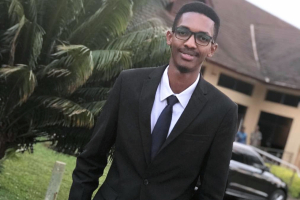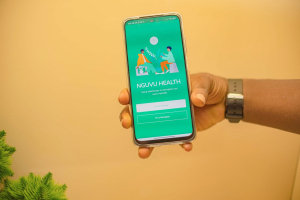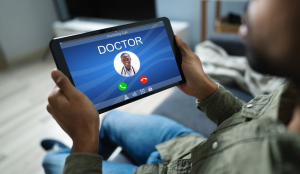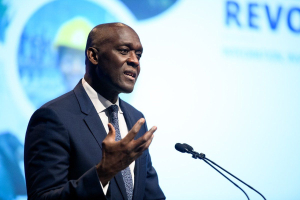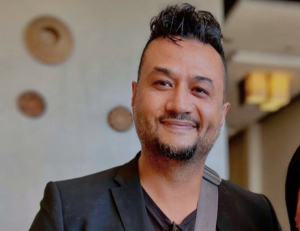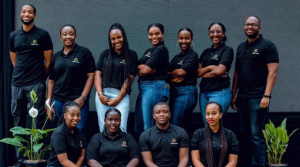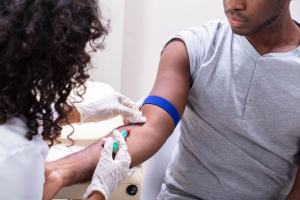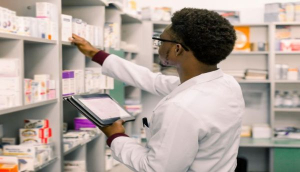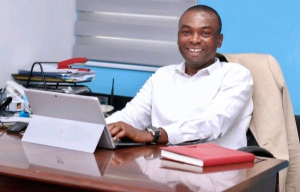Tanzania: Desire Ruhinda allows patients to consult a doctor remotely
A doctor by training, he wanted to address the poor access to healthcare services in his country. So, along with his friends, he launched an app that allows remote consultations.
Desire Ruhinda (photo) is a Tanzanian medical doctor who graduated from Kilimanjaro Christian Medical University with a Ph.D. in 2019. In 2021, he also graduated from the University of Cape Town's Graduate School of Business with a Master of Philosophy in Inclusive Innovation. A year earlier, he co-founded the healthtech startup Medikea, with his friends Elvis Silayo, and John Manko.
In 2016 he joined the International Federation of Medical Students Association as the national exchange officer. In 2019, he became a medical trainee at the Muhimbili University of Health and Allied Sciences.
Currently, he is the logistics manager of the non-government organization International Federation of Medical Students Associations (IFMSA).
He is also the CEO of the healthtech startup Medikea. Through the startup, he offers online consultations with doctors and supplements them with lab tests and home drug delivery, so patients can get timely care, avoid long queues and save money.
The doctors registered on the platform can manage common and chronic illnesses, mental health, and lifestyle issues. The solution is suited for anyone seeking high-quality, affordable, and convenient treatment for non-emergency medical problems, medical advice, a prescription, a letter of recommendation, a medical certificate, or a second opinion on a pre-existing condition.
Recently, in February, it was selected by Kenyan venture capital company The Baobab Network as one of the five startups that will participate in the 2023 Baobab Network's acceleration program. The selection entitles it to $50,000 support.
Melchior Koba
Nigeria: Nguvu provides mental health services online
Mental health is a taboo subject in most African societies. Yet, according to a 2017 report by the World Health Organization, more than 29 million Africans suffer from depression.
Nguvu is an e-health solution developed by a Nigerian startup. It gives users access to mental health experts online.
"Our customers are able to communicate – via text, audio, and video – directly in-app with their therapists and are able to schedule live video sessions with their matched therapists. This is particularly useful at such a time as this, post-pandemic. The effects of the COVID-19 pandemic have made mental health therapy more important than ever," explained Joshua Koya, Nguvu's co-founder, and CEO, in December 2021.
Users can access the services offered by the e-health startup using either its Android/iOS apps or by visiting its web platform. They can register, pass a test, and eventually get connected to a therapist. They can also choose between video consultations or text therapy. Currently, the Nguvu Android app has been downloaded more than 10,000 times on Playstore.
Let's note that some of the services offered by Nguvu are free. They include for instance free mental health screening. Meanwhile, additional text therapy services cost NGN3,000 (about US$6.5) weekly, NGN10,000 monthly, NGN27,000 quarterly, and NGN100,000 annually. For video therapies, each session cost NGN7,500 while the 4-session bundle costs NGN27,000.
For the time being, Nguvu operates in Nigeria and Kenya and dreams of conquering the world in the coming years. "Our vision is to extensively build tech solutions that revolve around preventing mental disorders from happening and correcting existing disorders," Joshua Koya indicates.
Adoni Conrad Quenum
Côte d’Ivoire : Skanmed revolutionizes online medical consultation
Côte d’Ivoire currently has an important shortage of physicians, with 1.4 doctors for every 10,000 individuals. E-health solutions are therefore important tools that can help bridge the gap. In that context, Skanmed wants to help by leveraging new technologies.
Skanmed is an e-health solution developed by Ivorian start-up Skan Technologies, launched in 2011. It allows users to remotely consult doctors, notably general physicians, pediatricians, and cardiologists.
Once registered on the e-health platform, users can search for doctors by specialty or by name. They can click on each medical practitioner suggested to check their information, register on their waiting list, or request an urgent video consultation.
In addition to the online consultations, the healthtech solution also offers home service. It has a team of doctors and nurses ready to provide home care 24 hours a day.
In 2021, Skanmed was the winner of the CGECI’s Grand Prix Business Plan Competition. The healthtech also won the first innovation prize awarded by the Ivorian Ministry of Health the same year. Currently, it plans to conquer the whole country before expanding outside. However, its debut was shaky as Skan founder Anicet Amani explains.
"The main challenge we faced was the lack of trust. During the prospecting phase, after the first version of the app, hospitals and physicians were not buying into our idea,” he said. The skepticism, however, disappeared after the startup signed an agreement with the Ministry of Health.
Adoni Conrad Quenum
IFC launches a $225mn vehicle to support SMEs, mainly in Africa
Developing innovative solutions to boost the SME world is a major concern for African economies. Yet, accessing financing remains a headache for sector players.
On Tuesday, November 15, the International Finance Corporation (IFC) announced the launch of a new vehicle dedicated to supporting venture capital systems in Africa, the Middle East, Central Asia, and Pakistan. This $225 million fund will provide seed funding for startups that address development issues in areas such as climate, health, education, agriculture, e-commerce, etc. through technological innovations.
“Support for entrepreneurship and digital transformation is essential to economic growth, job creation, and resilience. It will help innovative tech companies in Africa, the Middle East, Central Asia, and Pakistan expand during a time of capital shortage and create scalable investment opportunities. We want to help develop homegrown innovative solutions that are not only relevant to emerging countries but to the rest of the world,” said Makhtar Diop, IFC's Managing Director.
The already difficult access to funding for startups in low-income countries has worsened with the global slowdown in venture capital investment, the Covid-19 pandemic, rising food and supply chain costs, rising interest rates, and currency devaluations. However, countries still have a huge potential for development. In Africa, for example, the digital economy could contribute up to $712 billion to the continent’s GDP by 2050, according to a report published on June 9 by the international network of high-impact entrepreneurs Endeavor.
The IFC sees in its new platform a way to boost nascent venture capital markets in regions that have shown early growth potential but face challenging global economic conditions. The international organization says it will make equity and quasi-equity investments in tech startups and help them grow into scalable companies capable of attracting traditional equity and debt financing. It will also use the platform to collaborate with other World Bank Group teams to build and support venture capital ecosystems through regulatory reforms, sector analysis, and other tools.
An additional $50 million will be provided by the International Development Association's Private Sector Window Blended Finance Facility, which helps reduce the risk of investments in low-income countries.
Samira Njoya
Musaed Abrahams facilitates access to healthcare with Aviro Health
The physician has nearly 20 years of clinical experience in HIV/TB and 10 years of experience in the healthtech segment. The healthtech startup he founded provides effective and much-needed digital health solutions to “support self-care and provide access to services.”
Musaed Abrahams is a South African health professional and the founder/CEO of Aviro Health, a healthtech startup founded to improve access to quality healthcare in Africa.
“My goal is to create healthcare impact through technology by focusing on empathy, great design, and data,” his Linkedin profile reads.
His healthtech startup offers tech solutions that automate workflows, therefore allowing healthcare professionals to focus on important tasks. It also improves access to health information and provides digital consulting services. Currently, it claims more than 50,000 patients helped in South Africa and Kenya.
The startup developed Aviro Pocket Clinic to allow healthcare providers to easily and quickly perform digital HIV, tuberculosis, and diabetes checks. It also allows individuals to privatively perform those checks and access specialists and services for support when needed.
Its CEO holds a Bachelor of Medicine and Surgery (MBChB) obtained at the University of Cape Town in 2001. In 2010, he got an HIV management diploma from the Health Professions Council of South Africa. He also took part in the Harvard Business School’s Healthcare management program.
His professional career began in 2005 as a senior physician at the ARV Clinic in South Africa. He joined Médecin Sans Frontière (MSF) in 2008 as the HIV training coordinator in South Africa. Then, from 2013 to 2015, he worked as the organization's digital content producer and editor, contributing to the creation of the eighth edition of the MSF HIV/TB guide.
Currently, he is the deputy president of MSF's Southern Africa board. Between 2016 and 2017, he was a senior business development consultant for the health technology company Praekelt.org.
Let’s note that his startup, Aviro Health, was among the top 45 of the most innovative startups at the AfricaTech Awards 2022. It is also a beneficiary of the pan-African innovation program Investing in Innovation.
Melchior Koba
Rwanda: Eden Care offers access to customized and affordable healthcare
Though they are not yet popular like fintech and healthtech solutions, insuretech tools are garnering a fair share of attention in Africa. In Rwanda, a tech entrepreneur has developed a solution to allow access to decent healthcare for corporate employees.
Eden Care is a digital platform developed by a Rwandan eponymous start-up. It helps users subscribe to health insurance without even passing through insurance brokers.
"Eden Care was founded to create the kind of health insurance we wanted for ourselves – one that is affordable and doesn’t require filling six pages of documents at the hospital and a three-hour wait time. One where we can easily see our benefits and provides wellness tools, community, and incentives to enable us to get and stay healthy,” explains Moses Mukundi, CEO and founder of Eden Care.
The solution offers customizable and affordable health plans allowing firms to subscribe to plans based on the number of their employees. It boasts an extensive network of providers for good national coverage. If necessary, it resorts to telehealth.
It significantly reduces the paperwork with faster pre-authorizations and also reduced reimbursement times for medical providers.
"We see Eden Care as having what it takes to deliver that increase in value and service for consumers. […]By digitizing insurance processes and providing a wellness-first insurance cover to employers, Eden Care is making quality health insurance accessible to an underserved market – growing SMEs and businesses,” says Arnold Mwangi, partner at the Dutch impact investment firm DOB Equity, which contributed to the healthtech startup’s recent pre-seed round.
Adoni Conrad Quenum
Sierra Leone: LifeBlood aims to address the national blood shortage
In Africa, hospitals are still recording numerous deaths caused by the shortage of blood products. To solve this problem in his country, a Sierra Leonean tech entrepreneur has set up an e-health solution facilitating blood donation.
LifeBlood is a digital platform developed by a Sierra Leonean eponymous startup. It allows users to donate blood in a few clicks.
With its mobile app "Donate Blood," it streamlines the blood donation process. Once a user downloads the app and registers an account, he/she can carry out a blood test and, if everything goes well, donate blood and set a donation frequency. The app reminds its users of upcoming donations.
The Sierra Leonean startup has numerous blood donation centers, across the country. Its centers are usually set up in hospitals, giving users the choice to get to the centers closer to their homes or offices depending on their schedules. This approach helps users donate blood without causing much disruption to their tight schedules.
It also allows users to set up blood donation campaigns, and define the targets, periods, etc. With this feature, it aims to allow users to support its actions, therefore increasing the number of unpaid voluntary donors and improving the operational efficiency of blood services and the national blood safety service.
For its actions, the startup won the first prize of the Orange Social Venture Prize in Africa and the Middle East (POESAM), going home with a €25,000 check.
Adoni Conrad Quenum
DR Congo: Phati facilitates access to health products
Access to medicines sometimes proves challenging in Africa, leading tech entrepreneurs to develop innovative solutions to address the various issues.
Phati is an e-health solution developed by Congolese start-up Valorigo, founded in 2018. It helps users check whether health products are available in their neighborhoods, compare prices, and get directions to the most appropriate pharmacies.
Users can access the solution through its web platform and contact chosen pharmacies on Whatsapp. Indeed, when looking for specific health products, they just have to visit the Phati web platform and input their location and the name of the product. They will then get redirected to a page listing the pharmacies selling products, their prices, and contact details. Once the user selects a pharmacy to buy from, he/she is redirected to WhatsApp to complete the acquisition.
To be listed on Phati, pharmacies have to register by providing their name, address, and contact details. Apart from Phati, Valorigo has developed several other e-health solutions.
In September 2022, it was selected as one of the 30 healthtech startups that will participate in the pan-African program Investing in Innovation (i3).
Adoni Conrad Quenum
Côte d’Ivoire : Meditect eases access to quality health products
The solution was developed to, among other things, ease access to health products for the more than 50% of French-speaking African patients who are still buying drugs on street corners.
Meditect is an e-health solution developed by an Ivorian eponymous start-up. It allows access to quality health products, helps locate the nearest pharmacies, and verifies the authenticity of products they purchase. The start-up, founded in 2018 by Arnaud Pourredon and Romain Renard, aims to digitalize the drug distribution chain in Côte d'Ivoire.
According to Arnaud Pourredon, Meditect was created to help Africa, which is experiencing an unprecedented demographic explosion, address challenges preventing access to quality medicines with digitalization.
Thanks to its mobile app -available for Android and iOS devices, the solution helps users access information on the health products they are prescribed. Provided they are logged in or signed in, they can easily check the prices of the products and the pharmacies where they are available.
The solution also requires pharmacists to create accounts before submitting their pharmacies. To avoid data loss in case of unforeseen events, the startup stores data both locally and on the cloud. Currently, it operates in Senegal and Côte d’Ivoire, claiming more than 50,000 patients and 1,200 pharmacies. It also partners with local and customs authorities to combat counterfeit drugs. It has for instance helped seize more than 3,000 drugs. Play Store data show its Android app has been downloaded more than 10,000 times. In September 2022, the healthtech startup was selected to take part in the pan-African Investing in Innovation (i3).
Adoni Conrad Quenum
Ghana: Dennis Addo solves blood products’ access challenges with Wala Digital Health
The trained physician is a tech enthusiast and serial entrepreneur. From 2011 to date, he has founded three healthtech ventures.
Dennis Addo (photo) is a Ghanaian physician and entrepreneur. He is also the founder and CEO of health tech start-up Wala Digital Health, which he launched in 2019.
His startup, which was selected for the regional stage of the MEST Africa Challenge 2022, aims to facilitate hospitals’ access to blood products during medical emergencies. For that purpose, it developed a digital platform allowing hospitals and blood banks to order blood products and get them delivered.
The CEO, who is committed to the healthtech sector, is also the founder of Clarondoc, an online platform connecting Africans with health professionals since its launch in 2018. He is also the founder and CEO of Claron Health International, a health maintenance organization founded in 2011.
Apart from his entrepreneurial career, he has had a professional career boasting positions at national and national institutions. He started, in 2007, as a public health consultant and project manager at the Ghanaian Defense Ministry’s health directorate. About six years later, he was hired by the UN as a senior medical officer for missions in Côte d’Ivoire. From March to September 2020, he was a member of the global implementation team of the citizen-centric movement Covid Safe Paths.
Currently, he is a member of the board of the Ghanaian National Health Insurance Authority.
Melchior Koba


